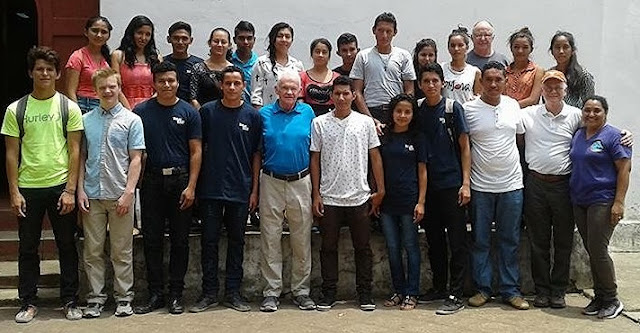Saying No to the Sense of Entitlement
 |
| Scholarship Students with Assumption Parish Delegation |
After about 20 minutes, we arrived where Salvador, a 20-year
old who is only in his second year of high school, lives with an unmarried
older brother. Only out of respect can you call it a “house.” It’s square with
four corrugated metal walls and a roof of the same material – not the best for a
humid climate with temperatures that are nearly always over 90 degrees. It has one
room furnished with two neatly-made beds.
The floor is of packed dirt. It has electricity, as
evidenced by the single bulb hanging from the ceiling, but no plumbing. There
is no apparent outdoor latrine.
A hundred yards or so above Salvador’s house is that of his
parents, who live with two daughters. The house is similar to Salvador’s – packed
dirt floor, no plumbing, sparse furniture. His parents are in their 40s and 50s
but look at least a decade older. Neither have jobs because they are unable to
work. The father has heart disease. The mother, a disease of the colon.
$80 per Month
Salvador, who works part-time as a waiter in a restaurant
along El Salvador’s coast, is the family’s only source of income. He makes $80
a month.
The visit to Salvador’s home was part of a week-long trip to
El Salvador by a delegation from our parish, Assumption of Granger, Ia., which has
a sister-parish relationship with a parish in a village called Tamanique. We
provide scholarships to help Salvador and 29 other kids from the community -
regardless of their religious affiliation – go to high school and college.
I’ve been on these trips to El Salvador many times, but coming
home, I can never adequately describe them. I always come back in a mild state
of shock. I want to tell people about the experience, but perhaps like veterans
coming home from foreign assignments, I have the feeling that people wouldn’t
understand. And though no one has said so, I feel they aren’t that interested.
We spend most of our time there simply visiting the kids and
their families, listening to them, trying to show solidarity. Most of them live
in what most Americans would call miserable poverty. Most parents have only a
couple of years of formal education. Many have none, and can’t read or write.
 |
| Salvador's House |
With each trip, I expect things to be a little better in El
Salvador – to see a little less poverty, the evidence of a little more
education, a little greater sense of pride among Salvadorans – but my
expectations go unfulfilled. No one feels this disappointment more than the
Salvadorans themselves.
Roberto Cruz, a Salvadoran friend, put it this way, referring
to the country’s brutal, 12-year civil war which ended in 1992.
“After the war, we thought everything would get better,” he
says, “that our children would be able to get a good education, that there
would be jobs, that we would finally be able to live decent lives. It hasn’t
turned out that way.”
The official El Salvador unemployment rate for 2016 is 7
percent, but people like Salvador’s family would find that figure laughable. In rural areas, at least, most people live from hand to
mouth in subsistence farming or low-paying, part-time jobs.
Theoretically, education is
free, but many rural children can’t afford to get back and forth from school or
pay for lunches. Crime and gang activity is rampant in much of the country.
Public services are sparse. And El Salvador attracts more than its share of natural
disasters. The country is prone to earthquakes and tropical depressions that regularly
kill thousands.
Resilient and Kind
Still, Salvadorans are among the most resilient and kindest
people I’ve ever met. They exhibit heroic hope in the face of apparent
hopelessness. The kids we help and their families are obviously smart. And
they’re grateful, and tell us so over and over.
While
there and upon my arrival at home, I find myself asking questions with no
apparent answers. How is that I was born into relative prosperity in a
prosperous country and so many people around the world live in misery? What,
exactly, did God have in mind?
The
only honest answer is, “I don’t know.” What I do know is that my relative
prosperity isn’t anything I earned. I have absolutely no reason to feel
superior or to have any sense of entitlement.
For
me, the inequality into which we’re born has nothing to do with “God’s will.”
And it isn’t random. It exists because we allow it. And no amount of prayer to
God to fix it will make a difference.
No,
God has given us the job of helping people like Salvador’s family. Programs
like ours help; but as human beings overall, we’re failing miserably.
If you would like to see more pictures from Tamanique, or contribute to the scholarship fund, click on http://assumptiongranger.org/parish-ministries/tamanique-sister-parish/
If you would like to see more pictures from Tamanique, or contribute to the scholarship fund, click on http://assumptiongranger.org/parish-ministries/tamanique-sister-parish/



Comments
Post a Comment